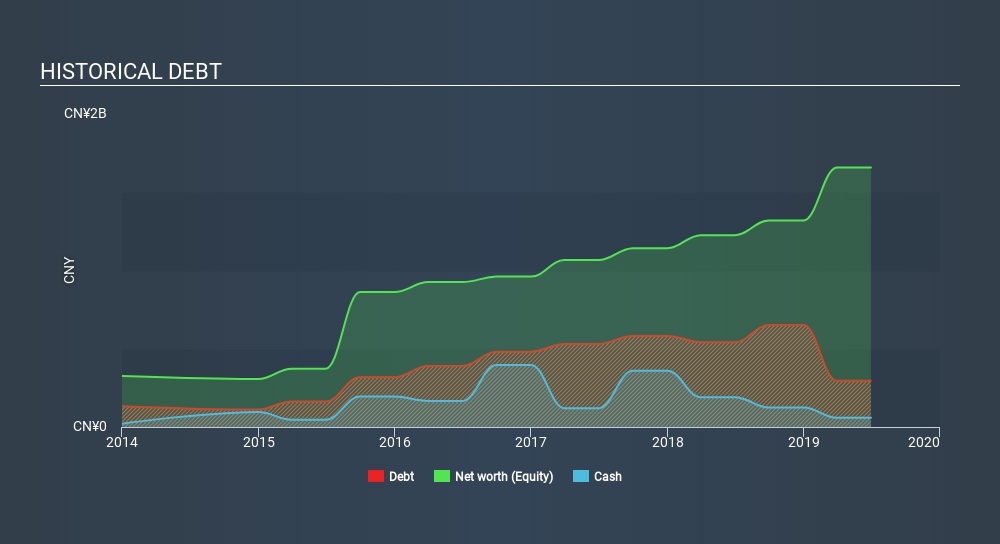
Some say volatility, rather than debt, is the best way to think about risk as an investor, but Warren Buffett famously said that 'Volatility is far from synonymous with risk'. When we think about how risky a company is, we always like to look at its use of debt, since debt overload can lead to ruin. As with many other companies Tsaker Chemical Group Limited (HKG:1986) makes use of debt. But the more important question is: how much risk is that debt creating?
What Risk Does Debt Bring?
Debt and other liabilities become risky for a business when it cannot easily fulfill those obligations, either with free cash flow or by raising capital at an attractive price. Part and parcel of capitalism is the process of 'creative destruction' where failed businesses are mercilessly liquidated by their bankers. While that is not too common, we often do see indebted companies permanently diluting shareholders because lenders force them to raise capital at a distressed price. Of course, debt can be an important tool in businesses, particularly capital heavy businesses. When we examine debt levels, we first consider both cash and debt levels, together.
View our latest analysis for Tsaker Chemical Group
What Is Tsaker Chemical Group's Net Debt?
As you can see below, at the end of June 2019, Tsaker Chemical Group had CN¥294.8m of debt, up from CN¥542 a year ago. Click the image for more detail. However, it also had CN¥58.4m in cash, and so its net debt is CN¥236.5m.

A Look At Tsaker Chemical Group's Liabilities
Zooming in on the latest balance sheet data, we can see that Tsaker Chemical Group had liabilities of CN¥807.5m due within 12 months and liabilities of CN¥45.5m due beyond that. On the other hand, it had cash of CN¥58.4m and CN¥334.2m worth of receivables due within a year. So its liabilities outweigh the sum of its cash and (near-term) receivables by CN¥460.5m.
This deficit isn't so bad because Tsaker Chemical Group is worth CN¥1.73b, and thus could probably raise enough capital to shore up its balance sheet, if the need arose. However, it is still worthwhile taking a close look at its ability to pay off debt.
We use two main ratios to inform us about debt levels relative to earnings. The first is net debt divided by earnings before interest, tax, depreciation, and amortization (EBITDA), while the second is how many times its earnings before interest and tax (EBIT) covers its interest expense (or its interest cover, for short). This way, we consider both the absolute quantum of the debt, as well as the interest rates paid on it.
Tsaker Chemical Group's net debt is only 0.29 times its EBITDA. And its EBIT easily covers its interest expense, being 37.1 times the size. So we're pretty relaxed about its super-conservative use of debt. Even more impressive was the fact that Tsaker Chemical Group grew its EBIT by 151% over twelve months. That boost will make it even easier to pay down debt going forward. There's no doubt that we learn most about debt from the balance sheet. But it is Tsaker Chemical Group's earnings that will influence how the balance sheet holds up in the future. So if you're keen to discover more about its earnings, it might be worth checking out this graph of its long term earnings trend.
Finally, a business needs free cash flow to pay off debt; accounting profits just don't cut it. So the logical step is to look at the proportion of that EBIT that is matched by actual free cash flow. Over the last three years, Tsaker Chemical Group reported free cash flow worth 2.3% of its EBIT, which is really quite low. For us, cash conversion that low sparks a little paranoia about is ability to extinguish debt.
Our View
Happily, Tsaker Chemical Group's impressive interest cover implies it has the upper hand on its debt. But the stark truth is that we are concerned by its conversion of EBIT to free cash flow. All these things considered, it appears that Tsaker Chemical Group can comfortably handle its current debt levels. Of course, while this leverage can enhance returns on equity, it does bring more risk, so it's worth keeping an eye on this one. There's no doubt that we learn most about debt from the balance sheet. However, not all investment risk resides within the balance sheet - far from it. Consider risks, for instance. Every company has them, and we've spotted 2 warning signs for Tsaker Chemical Group you should know about.
If you're interested in investing in businesses that can grow profits without the burden of debt, then check out this free list of growing businesses that have net cash on the balance sheet.
If you spot an error that warrants correction, please contact the editor at editorial-team@simplywallst.com. This article by Simply Wall St is general in nature. It does not constitute a recommendation to buy or sell any stock, and does not take account of your objectives, or your financial situation. Simply Wall St has no position in the stocks mentioned.
We aim to bring you long-term focused research analysis driven by fundamental data. Note that our analysis may not factor in the latest price-sensitive company announcements or qualitative material. Thank you for reading.
About SEHK:1986
Tsaker New Energy Tech
An investment holding company, manufactures and sells fine chemicals.
Excellent balance sheet low.
Market Insights
Community Narratives



